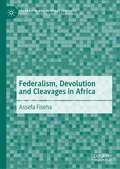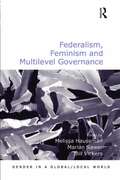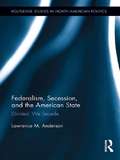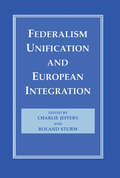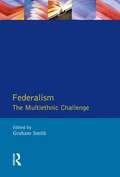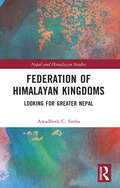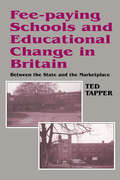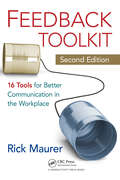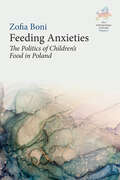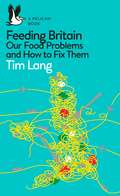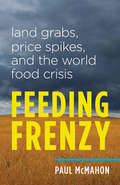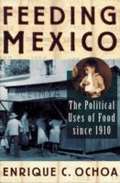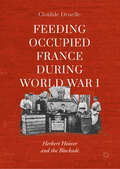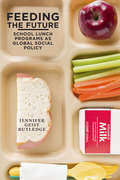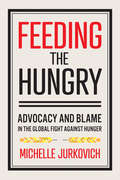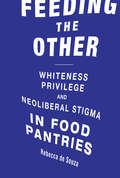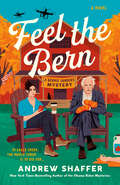- Table View
- List View
Federalism, Citizenship and Quebec
by Alain G. Gagnon Raffaele IacovinoCanadians often imagine their country as a multicultural democracy, while a few go further to claim that the country's diversity can be characterized as multinational in its social and institutional make-up. In Federalism, Citizenship, and Quebec, Alain-G. Gagnon and Raffaele Iacovino reveal how this notion has been falsely presented to the populace. Through comprehensive historical, contemporary, and critical accounts, they argue that the country has been the object of an aggressive nationalizing project that contravenes the principles of a 'multinational federation.' Gagnon and Iacovino defend a conception of diverse citizenship for Canada that is truly suitable to a durable and just constitutional association and provide an alternative path for the country based on normative, socio-political, and practical considerations associated with multinational democracy.Including a detailed account of the main challenges associated with Quebec's place in the federation, Federalism, Citizenship, and Quebec stands apart from other English-language studies on multinational democracy, citizenship, and federalism, and, most notably, multinational democracy in Canada. Gagnon and Iacovino ground their work in both history and theory, offering a truly interdisciplinary approach that will appeal to scholars from fields as diverse as Canadian and Quebec politics, comparative politics, and political and legal theory. The book will contribute to awareness of the need for appreciating diversity in contemporary societies while being a useful addition to English Canadian students in these fields, who often lack exposure to many of the rich debates proceeding in Quebec.
Federalism, Devolution and Cleavages in Africa (Federalism and Internal Conflicts)
by Assefa FisehaThis book explores the relationship between federalism, social divides and conflict in African countries. It details the origins, design and performance of major federal and quasi-federal states to assess their performance and propose new methods for managing these divides. Drawing on evidence from countries such as Ethiopia, Kenya, Nigeria and South Africa, the book examines the nature and causes of ethnonationalism, mobilisation and confrontation with the nation state. The book is a comprehensive treatment of the five major federal and devolved systems in Africa. It explains their origin, design and operation, and assesses their performance. More importantly, the book explains the distinct nature of federal and devolved systems in the Global South. Federal and devolved systems in Africa cannot be understood in isolation from the nature of state power on the continent. The book explains the impact of unregulated state power on the dynamics of federal and devolved systems in Africa. Federalism and devolution have not failed but have been betrayed – both in the past and the present – in serving as a venue for accommodation, intergovernmental bargaining and negotiated reform.
Federalism, Feminism and Multilevel Governance (Gender in a Global/Local World)
by Marian SawerUntil recently, few gender scholars took notice of the impact of state architecture on women's representation, political opportunities, and policy achievements. Likewise scholars of federalism, devolution and multilevel governance have largely ignored their gender impact. For the first time, this book explores how women's politics is affected by and affects federalism, whether in Australia, Canada, India, Mexico, Nigeria, Russia or the US. Equally, it assesses the gender implications of devolution and multilevel governance in the European Union, including case studies of the UK and Germany. Globally, multilevel governance is providing new arenas for women's politics. For example, CEDAW (the UN Convention for the Elimination of All Forms of Discrimination against Women) has led most governments to adopt gender-equality norms while other UN instruments have supported Aboriginal self-government. Gender scholars will find especially valuable what is revealed about the impact of political architecture on a broad range of policy issues, including gay marriage, reproductive rights and childcare. Federalism scholars will benefit from the book's wide range of cases, comparative themes and combination of gender and federalism perspectives. Written by leading experts, this book fills an important gap in both literatures.
Federalism, Nationalism and Development: India and the Punjab Economy (Routledge Contemporary South Asia Series)
by Pritam SinghThis book throws new light on the study of India's development through an exploration of the triangular relationship between federalism, nationalism and the development process. It focuses on one of the seemingly paradoxical cases of impressive development and sharp federal conflicts that have been witnessed in the state of Punjab. The book concentrates on the federal structure of the Indian polity and it examines the evolution of the relationship between the centre and the state of Punjab, taking into account the emergence of Punjabi Sikh nationalism and its conflict with Indian nationalism. Providing a template to analyse regional imbalances and tensions in national economies with federal structures and competing nationalisms, this book will not only be of interest to researchers on South Asian Studies, but also to those working in the fields of politics, political economy, geography and development.
Federalism, Plurinationality and Democratic Constitutionalism: Theory and Cases (Routledge Studies in Nationalism and Ethnicity)
by Ferran Requejo Miquel CaminalThis book provides a theoretical and comparative analysis of federalism and federations in plurinational democracies, examining how states with distinct peoples and communities coexist (or not). Through a theoretical approach to democracy and federalism, and interdisciplinary analysis of plurinationality in state organization, including case studies of the UK, Russia, Canada, Belgium, India, Spain, Switzerland and Bolivia, this text assesses the possibilities and limits of federalism as a way to recognize and accommodate multinationalism in plurinational democracies. It evaluates a range of strategies used by states to support national, ethnic, linguistic or religious collectives in present-day liberal democracies. Leading scholars in the field evaluate the institutional and practical repercussions regarding the issue of recognition and accommodation of national minorities in a globalised world, through different theoretical perspectives to build up a detailed picture of problems and solutions to multinationalism. Looking both within and beyond the state, this is an invaluable examination of dilemmas and institutional challenges faced by many modern democracies. Federalism, Plurinationality and Democratic Constitutionalism will be of interest to students, researchers and scholars of democracy, nationalism, federalism and constitutionalism.
Federalism, Secession, and International Recognition Regime: Iraqi Kurdistan (Federalism Studies)
by Alex DanilovichFederalism is widely believed to be an efficient tool to quell ethnic conflict, yet recently there has been a pronounced global tendency among ethnic minorities to break away from larger nations. Iraqi Kurdistan, a region within the newly established Iraqi federation, also harbors plans to proclaim its own sovereign state. This volume analyses the factors that have caused the Kurds to change their minds about living in a federal Iraq, and the reaction of their neighbors and the international community at large. Using a broad theoretical framework of federal studies and secession theory, this book examines the causes for the breakup of ethnic federations fuelled by nationalism as well as the international regime of recognition of newly formed entities. It provides a first-hand account and theoretically informed interpretations of the Iraqi situation, showing that federalism is not always a universal remedy for ethnic and religious conflicts; it also emphasizes that the international recognition regime is a significant variable in peoples’ actions and aspirations to sovereignty. Enriching the ongoing debate on federalism and self-determination, this volume will appeal to scholars and students of politics, international relations, and comparative politics, as well as those interested in federalism, the Middle East and Kurdistan.
Federalism, Secession, and the American State: Divided, We Secede (Routledge Studies in North American Politics)
by Lawrence M. AndersonOne important tradition in political science conceives of the Civil War in the United States serving as the functional equivalent of the English and French Revolutions, bringing with it the victory of liberal democratic industrialism over aristocratic agriculturalism. From this perspective, the Civil War is notable for its impact on the American state. Surprisingly however, little attention has been paid to the distinguishing features of this historic rupture in American politics. Through primary source research and the re-analysis of the rich historical literature about the antebellum era and the causes of the Civil War, Lawrence A. Anderson explores the relationship between federalism and the movement for secession in the United States during the pre-civil war era. Focusing primarily on South Carolina, Anderson carefully revisits theory on institutional analysis of political development to expose what caused secession in the United States.
Federalism, Unification and European Integration
by Roland Sturm Charlie JefferyThis is an assessment of how an established, federal constitutional framework can adapt to meet the challenge posed by the achievement of German unity and the deepening of european Unity.
Federalism: The Multiethnic Challenge
by Graham SmithThis book provides a comprehensive and detailed examination of the successes and failures of federalism in a diverse range of multi-ethnic polities and societies.It offers excellent coverage of the experiences of a wide range of contemporary states with specially commissioned contributions from established authorities.An introductory chapter introduces the reader to the nature of federations, the political philosophies that underpin federalism, the characteristics of federal formations, and highlights some of the theories as to why this system of government has failed in some cases to provide ethno-regional stability. A concluding chapter draws upon the findings and examines the prospects for federalism in the light of the acceleration towards greater economic interdependency and local political fragmentation, in the post-Cold War world.
Federation of Himalayan Kingdoms: Looking for Greater Nepal (Nepal and Himalayan Studies)
by Awadhesh C. SinhaThis book traces the history and politics of the Greater Nepal movement. It looks at major events in modern South Asia, in and around the Eastern Himalaya region in particular – colonialism, independence and partition, the Chinese aggression in Tibet, formation of Bangladesh, and the merger of Sikkim with India, among others – which deeply affected the nature of democratic movements in Nepal. The volume also studies the role of the monarchy, the demand for Gorkhaland, and the rise of Maoist movements. Further, it sheds light on political participation encompassing Nepalese functionaries, the many political parties, intellectuals and responsible public figures, and the differential influence that these variegated groups had on the movement. Finally, it reassesses the idea of Greater Nepal and offers a critical commentary on its future. The volume will be of great interest to scholars and researchers of international relations, modern history, sociology and social anthropology, politics, South Asian studies, and area studies – especially Nepal and Himalayan studies – as well as policy makers and government think tanks.
Fee-paying Schools and Educational Change in Britain: Between the State and the Marketplace
by Ted TapperExamining the history of access to private education this work sheds light on the interaction of state, society and schooling. Organized historically, much of the analysis concentrates on contemporary political struggles, and evaluates the possibility of a unified educational system.
Feedback Toolkit: 16 Tools for Better Communication in the Workplace, Second Edition
by Nigel Hooper Rick MaurerThis book provides expert guidance on using feedback as a performance improvement tool. It includes many simple tools readers can use to improve feedback in their work unit. The book suggests that feedback works best when the giver and receiver realize that they are in a dance together.
Feeding Anxieties: The Politics of Children's Food in Poland (New Anthropologies of Europe: Perspectives and Provocations #6)
by Zofia BoniFocusing on the underlying politics behind children’s food, this book highlights the variety of social relationships, expectations and emotions ingrained in feeding children in Poland. With rich ethnographic accounts, including research with children, the book demonstrates how families, schools, the food industry and state agencies shape and experience feeding anxieties, and how such anxiety is at the heart of a new form of sociality. The book complicates our understanding of health and modern subjectivity and unpacks what and how we feed children today.
Feeding Britain: Our Food Problems and How to Fix Them (Pelican Books)
by Tim LangHow does Britain get its food? Why is our current system at breaking point?How can we fix it before it is too late?British food has changed remarkably in the last half century. As we have become wealthier and more discerning, our food has Europeanized (pizza is children's favourite food) and internationalized (we eat the world's cuisines), yet our food culture remains fragmented, a mix of mass 'ultra-processed' substances alongside food as varied and good as anywhere else on the planet.This book takes stock of the UK food system: where it comes from, what we eat, its impact, fragilities and strengths. It is a book on the politics of food. It argues that the Brexit vote will force us to review our food system. Such an opportunity is sorely needed. After a brief frenzy of concern following the financial shock of 2008, the UK government has slumped once more into a vague hope that the food system will keep going on as before. Food, they said, just required a burst of agri-technology and more exports to pay for our massive imports.Feeding Britain argues that this and other approaches are short-sighted, against the public interest, and possibly even strategic folly. Setting a new course for UK food is no easy task but it is a process, this book urges, that needs to begin now.'Tim Lang has performed a public service' Simon Jenkins, Sunday Times
Feeding Frenzy
by Paul McmahonFeeding Frenzy traces the history of the global food system and reveals the underlying causes of recent turmoil in food markets. Supplies are running short, prices keep spiking, and the media is full of talk of a world food crisis. The turmoil has unleashed some dangerous forces. Food-producing countries are banning exports even if this means starving their neighbors. Governments and corporations are scrambling to secure control of food supply chains. Powerful groups from the Middle East and Asia are acquiring farmland in poor countries to grow food for export - what some call land grabs. This raises some big questions. Can we continue to feed a burgeoning population? Are we running out of land and water? Can we rely on free markets to provide? This book reveals trends that could lead to more hunger and conflict. But Paul McMahon also outlines actions that can be taken to shape a sustainable and just food system.
Feeding Frenzy: Attack Journalism and American Politics
by Larry J. SabatoThe author presents the phenomenon of "attack journalism." In describing "attack journalism," he exposes the harm done by the media to politicians and the harm done to the journalistic profession itself. The author examines the origins of feeding frenzies and gives lessons and possible remedies.
Feeding Mexico: The Political Uses Of Food Since 1910
by Enrique C. OchoaWinner of the 1998 Michael C. Meyer Manuscript Prize! <P><P> Feeding Mexico: The Political Uses of Food since 1910 traces the Mexican government's intervention in the regulation, production, and distribution of food from the days of Cardenas to the recent privatization inspired by NAFTA. Professor Ochoa argues that the real goals of the government's food subsidies were political, driven by presidential desires to court urban labor. Many of the agencies and policies were hastily set in place in response to short-term political or economic crises. Since the goals were not to alleviate poverty, but to provide modest subsidies to urban consumers, the policies did not eliminate destitution or malnutrition in the country. Despite the minimal achievements of these interventionist policies, the State Food Agency provided a symbol of the state's concern for the workers. The elimination of the Agency in the 1990s prompted social protest and unrest. <P><P> Feeding Mexico is the first study to examine the creation of networks to deliver food products, the relationship of these channels of distribution to the food crisis, and the role of the state in trying to ameliorate the problem. Based on exhaustive research of new archival material and richly documented with statistical tables, this book exposes the dynamics and outcome of social policy in twentieth-century Mexico.
Feeding Occupied France during World War I: Herbert Hoover and the Blockade
by Clotilde DruelleThis book examines the history of Herbert Hoover’s Commission for Relief in Belgium, which supplied humanitarian aid to the millions of civilians trapped behind German lines in Belgium and Northern France during World War I. Here, Clotilde Druelle focuses on the little-known work of the CRB in Northern France, crossing continents and excavating neglected archives to tell the story of daily life under Allied blockade in the region. She shows how the survival of 2.3 million French civilians came to depend upon the transnational mobilization of a new sort of diplomatic actor—the non-governmental organization. Lacking formal authority, the leaders of the CRB claimed moral authority, introducing the concepts of a “humanitarian food emergency” and “humanitarian corridors” and ushering in a new age of international relations and American hegemony.
Feeding On Dreams: Confessions of an Unrepentant Exile
by Ariel Dorfman"A multifaceted journey that is geographical, personal and political . . . A complex, nuanced view of United States–Latin American politics and relations of the last forty some years." — Durham Herald-Sun"One of the most important voices coming out of South America." — Salman RushdieIn September 1973, the military took power in Chile, and Ariel Dorfman, a young leftist allied with President Allende, was forced to flee for his life. In Feeding on Dreams, Dorfman portrays, through visceral scenes and with startling honesty, the personal and political maelstroms that have defined his life since the Pinochet coup. Dorfman&’s wry and masterfully told account takes us on a page-turning tour of the past several decades of North-South political history and of the complex consequences of revolution and tyranny, excavating for the first time his profound and provocative journey as an exile and the consequences for his wife and family."Fascinating." — San Francisco Examiner"A great book that will simultaneously undo us and sustain us." — Tikkun
Feeding People in a Crisis: The UK Food System and the COVID-19 Pandemic
by Michael Winter Matt Lobley Steven Guilbert Timothy Wilkinson Catherine BroomfieldAvailable open access digitally under CC-BY-NC-ND licence. ‘Panic buying’ at the start of the COVID-19 pandemic generated enduring media images of empty supermarket shelves and calls for food rationing. The fragility of the 'just-in-time' food system was seemingly exposed yet, as the pandemic progressed in the UK, there were remarkably few food shortages. This book reveals the changing patterns of food provision in the UK during that period, looking at how diets changed and how retail, processing, distribution and production businesses adapted. But beneath the apparent logistical success story, there were injustices as the more vulnerable struggled to access good quality food and some businesses received inadequate help. The authors consider the winners and losers in a time of rapid social change, the lasting impacts on the UK food system and lessons to be learned for a food system dependent on imports and large retailers and with a high burden of diet-related health issues.
Feeding the Future: School Lunch Programs as Global Social Policy
by Jennifer Geist RutledgeA century ago, only local charities existed to feed children. Today 368 million children receive school lunches in 151 countries, in programs supported by state and national governments. In Feeding the Future, Jennifer Geist Rutledge investigates how and why states have assumed responsibility for feeding children, chronicling the origins and spread of school lunch programs around the world, starting with the adoption of these programs in the United States and some Western European nations, and then tracing their growth through the efforts of the World Food Program. The primary focus of Feeding the Future is on social policy formation: how and why did school lunch programs emerge? Given that all countries developed education systems, why do some countries have these programs and others do not? Rutledge draws on a wealth of information--including archival resources, interviews with national policymakers in several countries, United Nations data, and agricultural statistics--to underscore the ways in which a combination of ideological and material factors led to the creation of these enduringly popular policies. She shows that, in many ways, these programs emerged largely as an unintended effect of agricultural policy that rewarded farmers for producing surpluses. School lunches provided a ready outlet for this surplus. She also describes how, in each of the cases of school lunch creation, policy entrepreneurs, motivated by a commitment to alleviate childhood malnutrition, harnessed different ideas that were relevant to their state or organization in order to funnel these agricultural surpluses into school lunch programs. The public debate over how we feed our children is becoming more and more politically charged. Feeding the Future provides vital background to these debates, illuminating the history of food policies and the ways our food system is shaped by global social policy.
Feeding the Hungry: Advocacy and Blame in the Global Fight against Hunger
by Michelle JurkovichFood insecurity poses one of the most pressing development and human security challenges in the world. In Feeding the Hungry, Michelle Jurkovich examines the social and normative environments in which international anti-hunger organizations are working and argues that despite international law ascribing responsibility to national governments to ensure the right to food of their citizens, there is no shared social consensus on who ought to do what to solve the hunger problem. Drawing on interviews with staff at top international anti-hunger organizations as well as archival research at the United Nations Food and Agriculture Organization, the UK National Archives, and the U.S. National Archives, Jurkovich provides a new analytic model of transnational advocacy. In investigating advocacy around a critical economic and social right—the right to food—Jurkovich challenges existing understandings of the relationships among human rights, norms, and laws. Most important, Feeding the Hungry provides an expanded conceptual tool kit with which we can examine and understand the social and moral forces at play in rights advocacy.
Feeding the Other: Whiteness, Privilege, and Neoliberal Stigma in Food Pantries (Food, Health, and the Environment)
by Rebecca T. De SouzaHow food pantries stigmatize their clients through a discourse that emphasizes hard work, self help, and economic productivity rather than food justice and equity.The United States has one of the highest rates of hunger and food insecurity in the industrialized world, with poor households, single parents, and communities of color disproportionately affected. Food pantries—run by charitable and faith-based organizations—rather than legal entitlements have become a cornerstone of the government's efforts to end hunger. In Feeding the Other, Rebecca de Souza argues that food pantries stigmatize their clients through a discourse that emphasizes hard work, self help, and economic productivity rather than food justice and equity. De Souza describes this “framing, blaming, and shaming” as “neoliberal stigma” that recasts the structural issue of hunger as a problem for the individual hungry person.De Souza shows how neoliberal stigma plays out in practice through a comparative case analysis of two food pantries in Duluth, Minnesota. Doing so, she documents the seldom-acknowledged voices, experiences, and realities of people living with hunger. She describes the failure of public institutions to protect citizens from poverty and hunger; the white privilege of pantry volunteers caught between neoliberal narratives and social justice concerns; the evangelical conviction that food assistance should be “a hand up, not a handout”; the culture of suspicion in food pantry spaces; and the constraints on food choice. It is only by rejecting the neoliberal narrative and giving voice to the hungry rather than the privileged, de Souza argues, that food pantries can become agents of food justice.
Feel the Bern: A Bernie Sanders Mystery
by Andrew ShafferWho knew fighting for a living wage could be so deadly? Bernie Sanders and his Gen Z intern are drawn into a murder investigation in a small Vermont town in this hilarious spin on cozy mysteries from the New York Times bestselling author of Hope Never Dies: An Obama Biden Mystery.Fall is bursting out all over Vermont, and while the rest of the Congress enjoys its recess, Senator Bernie Sanders has returned to his beloved home state for a weekend of events in Eagle Creek, &“America&’s #1 Leaf Peeping Destination.&” It&’s up to intern and Eagle Creek native Crash Robertson to keep the senator on schedule—and out of trouble.Crash&’s hopes for a quiet homecoming are dashed, however, when the lifeless body of a community banker with ties to &“Big Maple&” is found in Lake Champlain. While the sheriff&’s department closes the case as an accident, a leaked autopsy indicates foul play…with a trail of syrup leading directly to one of the senator&’s oldest friends. Bernie, taking a page from the cozy mysteries he&’s addicted to, enlists Crash in a quest to uncover the killer&’s true identity.If Crash allows the senator to go too far off-script, it will be the end of her yet-to-begin political career. But as the suspect list grows to include a tech bro set on &“disrupting&” the maple syrup industry, struggling small-business owners, and even Crash&’s own family, she realizes there&’s more on the line than her own future. If the unlikely duo can&’t solve the mystery of the Maple Murderer before they strike again, Bernie&’s life-long fight for justice may come to an unplanned end.This (totally fictional!) mystery also features recipes from Eagle Creek&’s Vermont Country Shed, including Vermont Cheddar Mac & Cheese, &“Feel the Bern!&” Maple Sriracha Hot Sauce, and more!
Feel the Grass Grow: Ecologies of Slow Peace in Colombia
by Angie LederachOn November 24, 2016, the Colombian government and the Revolutionary Armed Forces of Colombia signed a revised peace accord that marked a political end to over a half-century of war. Feel the Grass Grow traces the far less visible aspects of moving from war to peace: the decades of campesino struggle to defend life, land, and territory prior to the national accord, as well as campesino social leaders' engagement with the challenges of the state's post-accord reconstruction efforts. In the words of the campesino organizers, "peace is not signed, peace is built." Drawing on nearly a decade of extensive ethnographic and participatory research, Angela Jill Lederach advances a theory of "slow peace." Slowing down does not negate the urgency that animates the defense of territory in the context of the interlocking processes of political and environmental violence that persist in post-accord Colombia. Instead, Lederach shows how the campesino call to "slowness" recenters grassroots practices of peace, grounded in multigenerational struggles for territorial liberation. In examining the various layers of meaning embedded within campesino theories of "the times (los tiempos)," this book directs analytic attention to the holistic understanding of peacebuilding found among campesino social leaders. Their experiences of peacebuilding shape an understanding of time as embodied, affective, and emplaced. The call to slow peace gives primacy to the everyday, where relationships are deepened, ancestral memories reclaimed, and ecologies regenerated.

